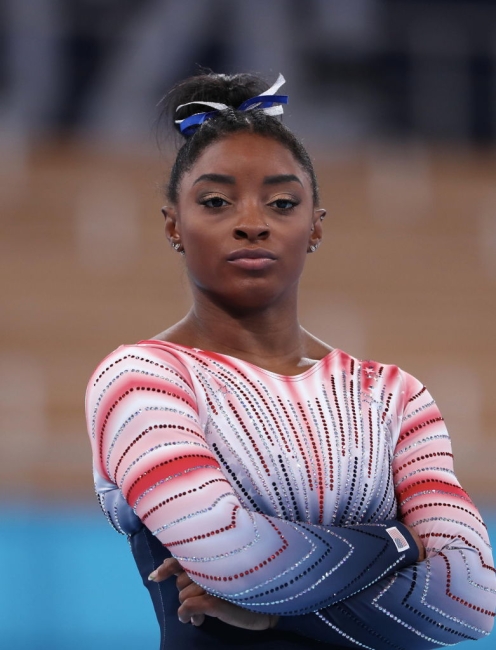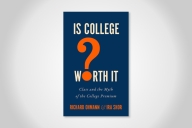You have /5 articles left.
Sign up for a free account or log in.

Simone Biles
Xavier Laine/Getty images sports
Commentators often mention in passing, but seldom explore in depth, the connections between academics and athletics. Those discussions serve universities, their faculty members and their graduate students poorly. It is time for change. Surprising as the idea may at first seem to some people, we need to follow sports in beginning a public reckoning with mental health.
The major academic conversations about sports surround the role of intercollegiate competition and its challenges -- now, most notably, compensation for student athletes, a term that no longer carries an agreed-upon meaning. But as colleges and universities begin another new semester, I recommend that we focus on some more fundamental aspects of academics and athletics and the ways they are similar.
Like sports, universities are organized in conferences and leagues, and they compete on numerous levels. They are ranked regionally, nationally and internationally. They receive scores; standings and rankings are closely compared. Like athletics, universities range from the minor to the major leagues, and faculty ranks range from lecturer to full professor. Universities compete for both literal and figurative trophies. Like sports, universities have a star system. Particularly in the sciences, and increasingly in interdisciplinary efforts, faculty members themselves form teams.
Yet such comparisons end starkly with mental health questions. During my 50 years from graduate school to an endowed chair and now retirement, I can attest that the taboo against admitting anxiety and depression (and worse) in the academy is greater than in major sports. It is most severe for graduate students, young women professors and minority faculty.
A handful of moving, almost confessional, personal accounts exist, and the clinical literature usually focuses on students. Nevertheless, the common mental health challenges of most professors remain a closely guarded secret. Admission of problems, no matter how common, remains a sign of weakness especially for junior (note the terminology) faculty, younger women and minority professors. Only in the rare confessions and conversations, have we confronted the impact of sexism, racism, classism and ageism.
Today, we've more clearly seen such interactions directly and indirectly with the disruptions of the pandemic. Still, we academics have no public movement or mechanisms of support to compare with the compelling and continuing revelations, as well as temporary mental health time-outs, of major sports figures. Consider, for example, the public acknowledgments and self-removal from competition of tennis star Naomi Osaka and champion gymnast Simone Biles, the two longer step-asides of tennis star Ash Barty, and the statements of swimming Olympic Gold Medalist Katie Ledecky and tennis champion Serena Williams. Record-holding gold medalist swimmer Michael Phelps made his public admission after retirement. He has become a leading national and international spokesperson for the mental health of athletes and all others. The stream of exemplars swells daily.
But in the academy, in sharp contrast, silence holds firmly, with only rare confessions. Hushed conversations among peers inadequately substitute for the sustained attention and systemic responses that the problem requires. At the same time, it is well known -- but not logically connected -- that academic careers are among the most challenging and uncertain professional journeys.
Indeed, the complications of academic careers are exceptional: uncertainty, lack or inconsistent application of objective standards, inflexible or fuzzy criteria, and the subjective and interpersonal nature of evaluations. Nothing quite comparable to tenure or promotion reviews exists in any other established profession. Graduate students and untenured faculty, ineligible for sabbaticals, cannot "step back" like Biles or Osaka -- except at high personal and financial costs.
Meanwhile, the personal and intellectual paths by which future academics self-select combine with those uncertainties to produce high levels of self-doubt, questions about confidence and competence, anxiety, depression and neurosis. I speak from personal experience, from graduate school through my success in rising in the ranks. In many ways, that history -- with the aid of excellent therapists and strong personal support -- made me a finer scholar and teacher. I can say with confidence that my bouts of depression helped me to become a better adviser to my graduate students and mentor to younger colleagues.
Conversations with colleagues across the country and beyond as well as with psychiatrists confirm that universities are a significant source of business for the counseling professions. One psychiatrist, for instance, tells me that he and his colleagues have attempted to reach out to university administrators -- without success. They've received no response in words or actions.
The stresses of the ongoing pandemic --the combined threats to both physical and mental health -- exacerbate these problems and my concerns. Meanwhile, many institutions' inability or refusal to follow public health experts and respond clearly and consistently to changing conditions and advancing knowledge also reinforce my arguments and call to action.
Can colleges and universities learn from today's heroic athletes, led by young women like Biles and Osaka? If we can promote sensitivity training for other forms of bias and harmful actions, beginning with administrators, why not for faculty mental health awareness and appropriate responses? Why can't higher education institutions attempt to create environments where individual faculty and graduate students feel comfortable speaking out like more and more athletes are? Our failure comes at our collective peril.








